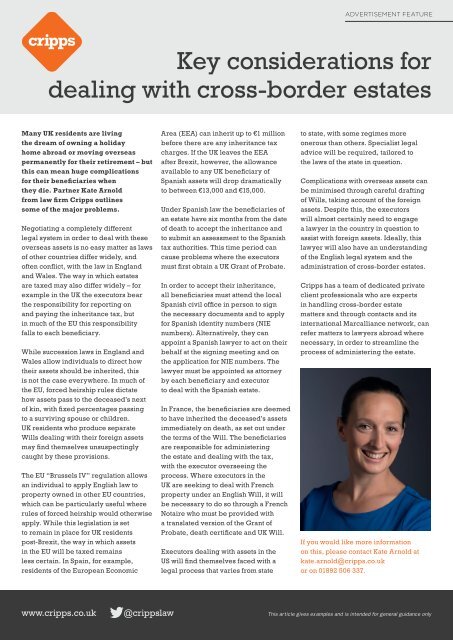Wealden Times | WT200 | October 2018 | Kitchen & Bathroom supplement inside
Wealden Times - The lifestyle magazine for the Weald
Wealden Times - The lifestyle magazine for the Weald
Create successful ePaper yourself
Turn your PDF publications into a flip-book with our unique Google optimized e-Paper software.
ADVERTISEMENT FEATURE<br />
Key considerations for<br />
dealing with cross-border estates<br />
Many UK residents are living<br />
the dream of owning a holiday<br />
home abroad or moving overseas<br />
permanently for their retirement – but<br />
this can mean huge complications<br />
for their beneficiaries when<br />
they die. Partner Kate Arnold<br />
from law firm Cripps outlines<br />
some of the major problems.<br />
Negotiating a completely different<br />
legal system in order to deal with these<br />
overseas assets is no easy matter as laws<br />
of other countries differ widely, and<br />
often conflict, with the law in England<br />
and Wales. The way in which estates<br />
are taxed may also differ widely – for<br />
example in the UK the executors bear<br />
the responsibility for reporting on<br />
and paying the inheritance tax, but<br />
in much of the EU this responsibility<br />
falls to each beneficiary.<br />
While succession laws in England and<br />
Wales allow individuals to direct how<br />
their assets should be inherited, this<br />
is not the case everywhere. In much of<br />
the EU, forced heirship rules dictate<br />
how assets pass to the deceased’s next<br />
of kin, with fixed percentages passing<br />
to a surviving spouse or children.<br />
UK residents who produce separate<br />
Wills dealing with their foreign assets<br />
may find themselves unsuspectingly<br />
caught by these provisions.<br />
The EU “Brussels IV” regulation allows<br />
an individual to apply English law to<br />
property owned in other EU countries,<br />
which can be particularly useful where<br />
rules of forced heirship would otherwise<br />
apply. While this legislation is set<br />
to remain in place for UK residents<br />
post-Brexit, the way in which assets<br />
in the EU will be taxed remains<br />
less certain. In Spain, for example,<br />
residents of the European Economic<br />
Area (EEA) can inherit up to €1 million<br />
before there are any inheritance tax<br />
charges. If the UK leaves the EEA<br />
after Brexit, however, the allowance<br />
available to any UK beneficiary of<br />
Spanish assets will drop dramatically<br />
to between €13,000 and €15,000.<br />
Under Spanish law the beneficiaries of<br />
an estate have six months from the date<br />
of death to accept the inheritance and<br />
to submit an assessment to the Spanish<br />
tax authorities. This time period can<br />
cause problems where the executors<br />
must first obtain a UK Grant of Probate.<br />
In order to accept their inheritance,<br />
all beneficiaries must attend the local<br />
Spanish civil office in person to sign<br />
the necessary documents and to apply<br />
for Spanish identity numbers (NIE<br />
numbers). Alternatively, they can<br />
appoint a Spanish lawyer to act on their<br />
behalf at the signing meeting and on<br />
the application for NIE numbers. The<br />
lawyer must be appointed as attorney<br />
by each beneficiary and executor<br />
to deal with the Spanish estate.<br />
In France, the beneficiaries are deemed<br />
to have inherited the deceased’s assets<br />
immediately on death, as set out under<br />
the terms of the Will. The beneficiaries<br />
are responsible for administering<br />
the estate and dealing with the tax,<br />
with the executor overseeing the<br />
process. Where executors in the<br />
UK are seeking to deal with French<br />
property under an English Will, it will<br />
be necessary to do so through a French<br />
Notaire who must be provided with<br />
a translated version of the Grant of<br />
Probate, death certificate and UK Will.<br />
Executors dealing with assets in the<br />
US will find themselves faced with a<br />
legal process that varies from state<br />
to state, with some regimes more<br />
onerous than others. Specialist legal<br />
advice will be required, tailored to<br />
the laws of the state in question.<br />
Complications with overseas assets can<br />
be minimised through careful drafting<br />
of Wills, taking account of the foreign<br />
assets. Despite this, the executors<br />
will almost certainly need to engage<br />
a lawyer in the country in question to<br />
assist with foreign assets. Ideally, this<br />
lawyer will also have an understanding<br />
of the English legal system and the<br />
administration of cross-border estates.<br />
Cripps has a team of dedicated private<br />
client professionals who are experts<br />
in handling cross-border estate<br />
matters and through contacts and its<br />
international Marcalliance network, can<br />
refer matters to lawyers abroad where<br />
necessary, in order to streamline the<br />
process of administering the estate.<br />
If you would like more information<br />
on this, please contact Kate Arnold at<br />
kate.arnold@cripps.co.uk<br />
or on 01892 506 337.<br />
www.cripps.co.uk @crippslaw This article gives examples and is intended for general guidance only


















